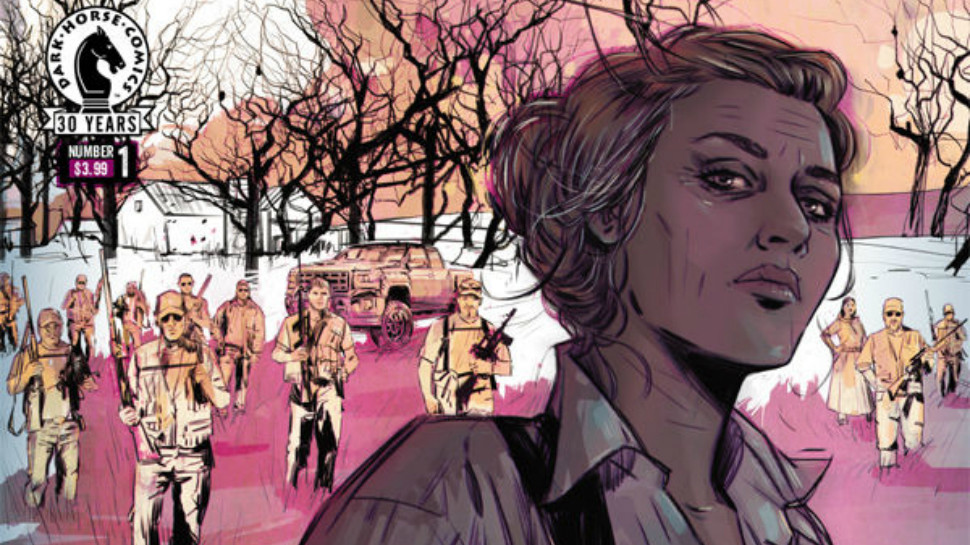
Brian Wood, thank you for your time. I am a big fan of your work going back to your work with Ryan Kelly on Local and Northlanders at Vertigo. Thank you for taking time out of your day to talk about some of your recent books and your soon to be returning hit Briggs Land.
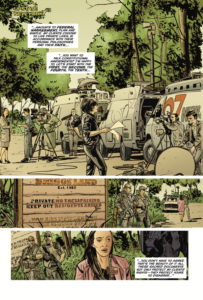 Rogues Portal (RP): Brian, your work always seems to have a distinctive voice to it. Even in this current era where we have so many quality books coming out your books always have a unique voice to them. How do you go about distinguishing your books from the rest of the market?
Rogues Portal (RP): Brian, your work always seems to have a distinctive voice to it. Even in this current era where we have so many quality books coming out your books always have a unique voice to them. How do you go about distinguishing your books from the rest of the market?
Brian Wood (BW): I don’t know… honestly, I don’t think about it that much, especially after some twenty years making comics. I think whatever it is I do is just automatically baked in, and I stopped worrying about things like branding and hype some time ago. That’s not always to my benefit – sometimes I wish I had the social media chops or the ability to harness fan enthusiasm like some of my peers, but I’ve resigned myself to be the guy who “flies under the radar” because what’s really important is the work itself.
I have noticed, over the years, that a lot of the books I pitch get rejected for being too unmarketable, too weird, or too niche – like in the case of STARVE, a book I have a lot of love for, but man, no editor understood that book in pitch form, so Danijel and I just went ahead and did the first issue upfront to prove what it was. REBELS is another one, where I really had to sell the idea that, yeah, a historical comic about colonial times is worth doing (this was a couple of years before Hamilton). And right now, I have a few pitches that would probably make for good comics, but they’re too atypical for an editor to buy.
But maybe that’s part of what I do? A lot of the books that I, and my collaborators, are known for are books that probably seemed a little odd at the start, be it DEMO, or STARVE, or NORTHLANDERS. When Becky and I did our DEMO sequel at Vertigo, no one edited the scripts because no one understood them (I was told, later).
But I’ll stand by the books, even when they don’t sell great, because they find an audience eventually and I’d rather that be my career than trying to read the market and create books just to fill an imagined need or tap into a trend.
And obviously, I am only half (or less) or the comic-making equation. The artists I partner with, that I create with, are fully a part of what makes them what they are.

RP: In the market today, from the outside looking in, it would appear that Image is a haven for creators and creator owned content. What has made Dark Horse the recent home for most some of your creator owned content, Briggs Land in particular?
BW: I’ll say that I like both Image and Dark Horse, but writing for each is pretty different. I like working with editors, I like having a design and production staff at the ready, and a PR department. When doing longform work, like THE MASSIVE or REBELS or BRIGGS LAND, I need that support so I can focus on the writing. At Image, there’s so, so much freedom, but I find myself doing perhaps more non-writing that I care for, like uploading to the FTP, making PDFs, making schedules, doing PR, and so on. It’s not a bad thing, doing all that, but on balance if I’d always rather spend time writing.
When the regime change happened at DC many years ago, and DMZ was ending and NORTHLANDERS was cancelled (as well as my exclusive contract health insurance) and I was shown the door, Dark Horse – and editor Sierra Hahn especially – stepped up and immediately guaranteed me two books a month worth of work. Which was them going out on a limb to give me some peace of mind, and I’ll never forget that.
All that said, I do enjoy publishing with Image and will continue to do so… probably shorter, more atypical material, like STARVE was.
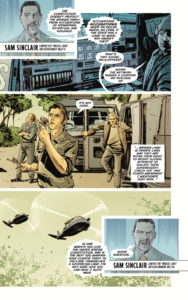 RP: I know creative endeavors have gestation periods for a long time in the minds of creators, how did you get to the germ of the idea that lead to Briggs Land? I remember it being talked about then it felt like ‘boom’ it was out.
RP: I know creative endeavors have gestation periods for a long time in the minds of creators, how did you get to the germ of the idea that lead to Briggs Land? I remember it being talked about then it felt like ‘boom’ it was out.
BW: Yeah, I was keeping extra quiet about it because we had the AMC TV deal going early on. The idea is years and years old – in doing some research for DMZ I had come across some stuff about militias that was pretty interesting. Then, with REBELS and researching colonial militias, I was reminded of that. I knew I needed to create a new project in my unofficial “line of political comics” (CHANNEL ZERO>DMZ>THE MASSIVE) so I thought there was something there. So I let it sit in the back of my head and bake awhile.
RP: Briggs Land features a strong female protagonist (Grace) who seizes control from a prototypical Male Patriarch. What made you start the book there? What about that part of the story was interesting to you?
BW: Originally, the lead character in BRIGGS LAND was the husband – it was a very typical sort of organized crime thing, with a Tony Soprano type in there. The pitch worked well enough like that, and I had run it by my guy at AMC, but their interest wasn’t sparked.
I don’t remember exactly why or when I had the thought to swap it over to the wife being in charge, but once I did, not only did it work better, it sparked tons of interesting conflicts and story ideas and dynamics that weren’t there before. And AMC wanted it to badly they bought it based only on that pitch.
With a little hindsight, and the more pages I write, the more I realize I’m subconsciously writing my mother into Grace – a hard-worn single mother who lived her life thinking there was only ever one way to do things… but in her case she died without truly becoming her own person. Grace gets that chance – its immensely satisfying to write that.
RP: In Briggs Land, the principal family we are following seems to have heavy “Alt Right” leanings. How were you able to know that this movement would gain such fervor in the coming months, leading up to and including the election?
BW: I didn’t know… I mean, not like it is now. But we had the 2014 Bundy standoff, and the more recent Bundy-affiliated 2016 standoff in Oregon. Less recent, Tim McVeigh and Ruby Ridge and the Unabomber. It’s always been there, simmering under the surface, and that was what I thought I was tapping into. Now we’re at a whole new level.
One thing I’ve been trying to make sure it’s clear is the range of ideologies present in the Briggs family – if you define “alt-right” as being a racist term, which most people do, there’s really only one Briggs son that fits that label. Grace herself is more of an old-fashioned back-to-the-land person. The Land itself is diverse, and I like to think the overall arc of the series is one of trying to expel extremism, even if in the short term Grace has to live in a moral gray area.
RP: Brian, you do a lot of subversion of expectations in your books. A prime example being, in “Briggs Land”, the brother who is the accountant. He, from what we have seen, is the toughest and most ruthless of his brothers. What about that character is the most interesting for you to write?
BW: I find Caleb scary because he’s unexpected, he’s unpredictable. He doesn’t wear his affiliations on the sleeve, so to speak. I mean, they’re tattooed on his skin, sure, but he dresses like a square and has a pocket protector. He can hide in plain sight.
As a writer, not only are characters like that fun to write, it’s a source of story material, it’s a conflict or a trait that will always be there that you can play off of. It gives him a little instability.
RP: Switching gears here, your Image book Black Road is about Vikings. The Viking time period seems to be resurgent in the cultural zeitgeist with shows like The Lost Kingdom and Vikings. What about the relatively short period of time (almost 300 years) is it interesting to you and why do you think it’s becoming more and more prevalent in mainstream pop culture?
BW: I was challenged, back in 2008 or so, by my editor at Vertigo to pitch a new book, but to get out of my comfort zone, to pitch something that would be a new challenge for me. To this day I can’t say exactly why I got stuck on Vikings, but I did, and Vertigo bought it. I didn’t realize how well-suited I was to this history until I started writing it, and the combo of history (which I’ve always loved), rugged landscapes, people fighting for survival, and the clash of cultures basically makes me drunk with story potential. If I had my way, I’d still be writing Northlanders. We’d have like 20 trades by now.
I can’t speak to the Vikings TV show (I do like the novels that The Last Kingdom is based off of) – I try not to watch them, I just like my version of that history better.
You know, it’s always bugged me that NORTHLANDERS is always mentioned as being by me, and not the artists… I mean, we had 17 artists on that series so I get why it happens, but that was a LOT of work for each of those artists, since I was being so slavish in trying to stay historically accurate. Everyone did a killer job, and I’m forever thankful.
RP: Black Road takes place during the savage and ruthless conversion of the countries on the Jutland peninsula to Christianity. What about that is interesting to you as a writer?
BW: BLACK ROAD is a slightly different beast… its less historically accurate than NORTHLANDERS, which was partially me wanting to spare Garry Brown all the added work of staying accurate, and I also didn’t want to exactly copy NORTHLANDERS. So I wrote a different type of Viking story and stayed out of Garry’s way – I wanted it to be its own thing and not just an extension of something else.
In reality, the Christian conversion of the pagan lands was, by and large, pretty peaceful and uneventful. I’ve always credited the Vikings with bring pragmatists, recognizing its easier (and more profitable) to roll with the punches and say, sure, we’ll be Christian if we get to hold onto our land and power – we’ll just keep praying to our own gods in private. For BLACK ROAD, we create a semi-fictional nation of Norssk that’s suffering under a conversion that’s a wartime occupation, full of violence and burning churches and corruption and death. THAT’s pretty interesting as a writer, but, like I said, not historically accurate.
RP: Finally, I want to talk about your Dark Horse book “Rebels”. The original series takes place during the revolutionary war. This is an era of history oft written about and yet your series is hitting on parts of the war that haven’t been shown too much in fiction. How did you take such a popular time period and still manage to find new stories to tell?
BW: I’m writing a fictional story set in history, and intentionally staying away from the stories everyone already knows about his time period – the major battles, the near-mythological events, the founding fathers themselves. Like NORTHLANDERS, REBELS is (mostly) the stories of the small, unknown people.
I grew up in Vermont, and this was local history for me – I feel connected to this history, that it belongs to me in a way. So that comes through in the writing as well, I think… a slightly different POV. The co-creator Andrea Mutti is a huge geek for this history as well, and I think it shows. I pushed him to make it so it doesn’t look like the characters are in costume, but that they seem like real people.
And because I felt that connection and ownership, I really wanted to do what I could to push back against what we all had been seeing coming from right wing politicians and the Tea Party Patriots, the appropriation of this history for their partisan messaging, the idea that this history, and even patriotism itself, is a conservative thing, a Republican thing (there’s also a feeling amongst a bunch of lefty friends of mine that lefties can’t express patriotism and still be lefties). I consider myself a patriot, I believe in the idea of America, the “American experiment”, so all of that really pissed me off. I wanted REBELS to exist as a non-partisan thing, a celebration of the history that anyone can access.
RP: From your Twitter feed, I can tell you’re a Hamilton Fan. (Who isn’t?) What’s your favorite song or piece of Hamilton trivia?
BW: God, who knows. Hamilton is a tremendous work of art and had it come before we published REBELS, I might not have bothered. It’s a bar that nothing else will ever be able to clear.
I remember – sort of a funny story – I was in Portland OR for ComicsPro, the comic book retailer meeting, to address retailers about the upcoming launch of REBELS, to talk about the book, hype it up, give them reasons to order it for their shops. I was trying to make the point that this history has mass appeal – I cited Assassin’s Creed, the HBO miniseries John Adams, the AMC show Turn, and so on. The morning of that talk, my wife texts me, I think about an hour before my presentation, with a link to a New York Times article – Hamilton had just opened off-Broadway, its first show ever, and maybe I could mention it as a selling point, this hip hop musical?
I think I did mention, and got a laugh from the crowd – no one, myself included, had any idea.

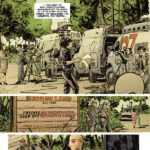
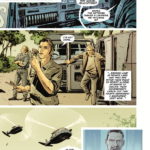

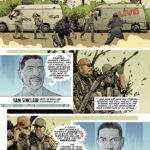
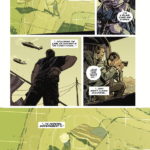
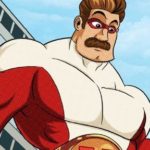

![[REVIEW] I MADE THE CAULIFLOWER CASSEROLE FROM ‘HAHA #5’](https://geekd-out.com/wp-content/uploads/2021/05/Haha5-150x150.jpg)
One thought on “An Exclusive First Look at Briggs Land: Lone Wolves and a Chat with Brian Wood”